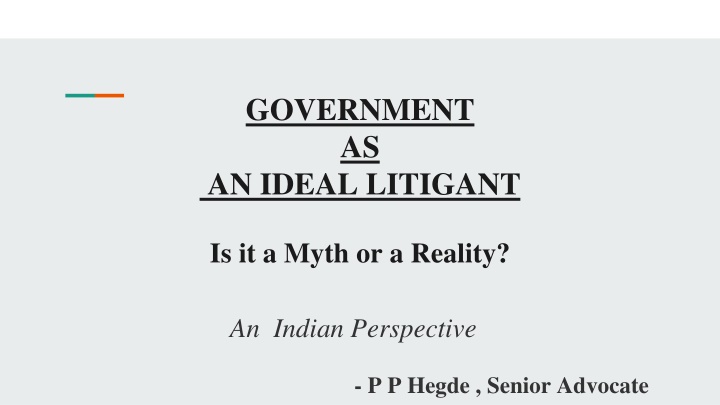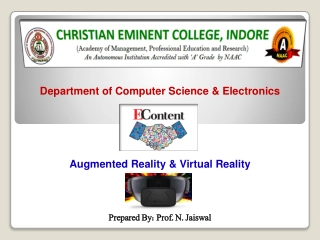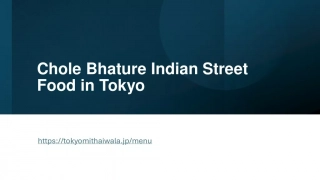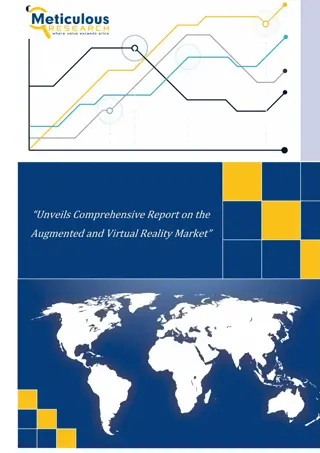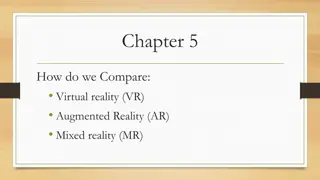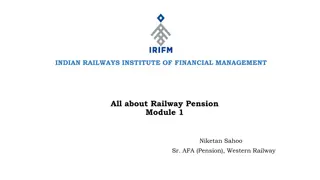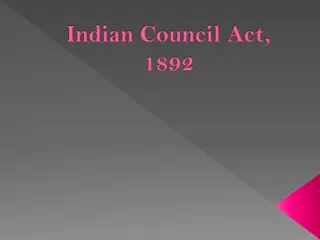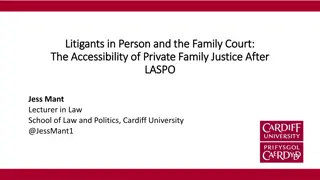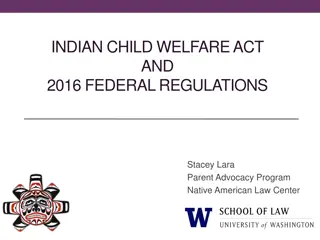Government as an Ideal Litigant - Myth or Reality: An Indian Perspective
The National Litigation Policy in India aims to reduce court case pendency and improve efficiency. It emphasizes responsible and efficient litigation practices, focusing on core issues, avoiding unnecessary litigation, and ensuring proper representation. Implementation involves appointing nodal officers, accountability measures, and government panel empowerment through training and conferences for government advocates. The shift towards a responsible litigant involves discouraging false pleas, avoiding compulsive litigation, and promoting competent legal representation. The article explores the transition needed for the government to become an ideal litigant in the Indian legal system.
Download Presentation

Please find below an Image/Link to download the presentation.
The content on the website is provided AS IS for your information and personal use only. It may not be sold, licensed, or shared on other websites without obtaining consent from the author.If you encounter any issues during the download, it is possible that the publisher has removed the file from their server.
You are allowed to download the files provided on this website for personal or commercial use, subject to the condition that they are used lawfully. All files are the property of their respective owners.
The content on the website is provided AS IS for your information and personal use only. It may not be sold, licensed, or shared on other websites without obtaining consent from the author.
E N D
Presentation Transcript
GOVERNMENT AS AN IDEAL LITIGANT Is it a Myth or a Reality? An Indian Perspective - P P Hegde , Senior Advocate
I. INDIAN LITIGATION POLICY The National Litigation Policy in India was announced on 23-6-2010 with a vision to reduce the cases pending in various courts and to reduce the average pendency time from 15 years to 3 years. Mission - To transform the Government into an efficient and responsible litigant. "Efficient litigant" means - Focusing on the core issues involved in the litigation and addressing them squarely. - Managing and conducting litigation in a cohesive, coordinated and time-bound manner. - Ensuring that good cases are won and bad cases are not needlessly persevered with. - A litigant who is represented by competent and sensitive legal persons: competent in their skills and sensitive to the facts that the Government is not an ordinary litigant and that a litigation does not have to be won at any cost.
"Responsible litigant" means - That litigation will not be resorted to for the sake of litigating. - That false pleas and technical points will not be taken and shall be discouraged. - That nothing will be suppressed from the court and there will be no attempt to mislead any court or tribunal. The Government must cease to be a compulsive litigant. The philosophy that matters should be left to the courts for ultimate decision has to be discarded. The easy approach, "Let the court decide", must be eschewed and condemned.
Implementation of the Scheme (A) Nodal Officers will be appointed by Heads of Department. (C) Accountability of the Nodal Officers (D) Empowered Committees to monitor the implementation of this Policy and accountability - The Nodal Officers and the Heads of Department will ensure that all relevant data is sent to the Empowered Committees. The Empowered Committee at the national level shall be chaired by the Attorney General for India.
Empowering the Government Panel (A) A government panel must be broad based with the cross-section of lawyers. Government panels cannot be vehicles for sustaining incompetent and inefficient persons. (B) Screening Committees for constitution of panels - The Screening Committees will make their recommendations to the Ministry of Law. (C) Government Advocates must be well-equipped and provided with adequate infrastructure. (D) Training programs, seminars, workshops and refresher courses for Government Advocates and continuing legal education for government lawyers. (E) National and regional conferences of Government Advocates. (F) Advocates-on-Record must play a meaningful role in government litigations. Promotions or out of turn increments for extraordinary work. (G) Responsibility of all Law Officers to train panel lawyers.
Pleadings/counters (A) Suits or other proceedings initiated by or on behalf of the Government have to be drafted with precision and clarity. (B) Counter-affidavits in important cases will not be filed unless the same are shown to and vetted by Law Officers. Filing of appeals (A) Appeals will not be filed against ex parte ad interim orders. Attempt must first be to have the order vacated. An appeal must be filed against an order only if the order is not vacated and the continuation of such order causes prejudice. (B) Appeals will not be filed in the Supreme Court unless the case involves a question of law; if it is a question of fact, the conclusion of the fact is so perverse (C) where public finances are adversely affected, where there is substantial interference with public justice, where there is a question of law arising under the Constitution, where the High Court has exceeded its jurisdiction, where the High Court has struck down a statutory provision as ultra vires & where the interpretation of the High Court is plainly erroneous.
Limitation: Delayed appeals (A) Applications for condonation of delay are presently drafted in routine terms without application of mind and resorting to word processed "boiler plate". This practice must immediately stop. (B) Every attempt must be made to reduce delays in filing (C) The question of limitation and delay must be approached on the premise that every court will be strict with regard to condonation of delay. Alternative dispute resolution (A) The resort to arbitration as an alternative dispute resolution mechanism must be encouraged at every level. (B) The Head of Department will call for the data of pending arbitrations.It shall be the responsibility of the Head of Department to call for regular review meetings to assess the status of pending arbitration cases. (C) The arbitrator must be chosen solely on the basis of knowledge, skill and integrity and not for extraneous reasons. (D) Routine challenge to arbitration awards must be discouraged.
Specialised litigation (A) Proceedings seeking judicial review including in the matter of award of contracts or tenders - Cases where projects may be held up have to be defended vigorously keeping in mind public interest. They must be dealt with and disposed of as expeditiously as possible. (B) Cases involving vires, or statutes or rules and regulations - In all such cases, proper affidavits should be filed explaining the rationale between the statute or regulation and also making appropriate averments with regard to legislative competence. (C) Public interest litigations (PILS) - Public interest litigations must be approached in a balanced manner. PILS challenging public contracts must be seriously defended. If interim orders are passed stopping such projects then appropriate conditions must be insisted upon for the petitioners to pay compensation if the PIL is ultimately rejected. (D) PSU litigations - Litigation between public sector undertakings inter se between government public sector undertakings is causing great concern. Every effort must be made to prevent such litigation.
Review of pending cases (A) All pending cases involving the Government will be reviewed. (B)The Office of the Attorney General and the Solicitor General shall also be responsible for reviewing all pending cases and filtering frivolous and vexatious matters from the meritorious ones. (C) The practice of grouping should be introduced whereby cases should be assigned a particular number of identity according to the subject and statute involved. In fact, further sub- grouping will also be attempted. To facilitate this process, standard forms must be devised which lawyers have to fill up at the time of filing of cases. Panels will be set up to implement categorisation, review such cases to identify cases which can be withdrawn. These include cases which are covered by decisions of courts and cases which are found without merit withdrawn. This must be done in a time-bound fashion.
II. Fundamental Right to Legal Justice Article 38(1) provides that the State should strive for a social order in which such justice shall inform all the institutions of national life. While interpreting this provision in L. Babu Ram v. Raghunathji Maharaj, AIR 1976 SC 1734, the Supreme Court held that social justice would include legal justice which means that the system of administration of justice must provide a cheap, expeditious and effective instrument for realisation of justice by all sections of people irrespective of their social or economic position or their financial resources. Article 39-A mandates the State to provide legal aid. It further states that the State shall secure that the operation of the legal system promotes justice ... to secure that opportunities for securing justice are not denied to any citizen by reason of economic or other disabilities. The constitutional commitment to speedy justice flows from the combined reading of Articles 14, 19 and 21 of the Constitution of India.
Justice P.N. Bhagwati observed that unlike the American Constitution, speedy trial is not specifically enumerated as a fundamental right; it is implicit in a broad sweep and content of Article 21 of the Indian Constitution as interpreted in Maneka Gandhi v. Union of India, AIR 1978 SC 597, where it was held that such procedure which does not ensure a reasonable quick trial cannot be regarded as a reasonable, just and fair procedure. The Court added that there can, therefore, be no doubt that speedy trial, and by speedy trial we mean a reasonably expeditious trial, is an integral and essential part of fundamental right to life and liberty enshrined in Article 21 . The learned Judge pointed out the integral connection between Articles 14 and 21 in the following words, Article 14 strikes at arbitrariness in state action and ensures fairness and equality of treatment. The principles of reasonableness, which legally as well as philosophically, is an essential element of equality or non-arbitrariness pervades Article 14 like a brooding omnipresence and the procedure contemplated by Article 21 must answer the test of reasonableness in order to be in conformity with Article 14. It must be right, just and fair and not arbitrary, fanciful or oppressive, otherwise, it would be no procedure at all and the requirement of Article 21 would not be satisfied.
III. Duty of the Government includes : 1. 2. 3. 4. 5. To provide Sufficient number of Courts To provide Proper infrastructure to Courts To Fill up the vacancies in the Courts To provide sufficient number of Public prosecutors and the staff Before enacting new legislations, to provide for sufficient Courts and establishments to meet requirements under the new enactments
IV. Stop Adjournments (A) Accepting that frequent adjournments are resorted to by Government lawyers, unnecessary and frequent adjournments will be frowned upon and infractions dealt with seriously. (B) In fresh litigations where the Government is a Defendant or a Respondent in the first instance, a reasonable adjournment may be applied for, for obtaining instructions. However, it must be ensured that such instructions are made available and communicated before the next date of hearing. If instructions are not forthcoming, the matter must be reported to the Nodal Officer and if necessary to the Head of the Department. (C) In Appellate Courts, if the paper books are complete, then adjournments must not be sought in routine course. The matter must be dealt with at the first hearing itself. In such cases, adjournments should be applied for only if a specific query from the court is required to be answered and for this, instructions have to be obtained.
V. Service of Notices on Government Bodies - Guidelines The Supreme Court in Central Electricity Regulatory Commission v. National Hydroelectric Power Corpn. Ltd., (2010) 10 SCC 280 at page 281, has held (i) In addition to normal mode of service, service of notice(s) may be effected by e-mail for which the Advocate(s)-on-Record will, at the time of filing of petition/appeal, furnish to the filing counter a soft copy of the entire petition/appeal in PDF format; (ii) The Advocate(s)-on-Record shall also simultaneously submit e-mail addresses of the respondent(s) companies/corporation(s) to the filing counter of the Registry. This will be in addition to the hard copy of the petition/appeal; (iii) If the court issues notice, then, in that event alone, the Registry will send such an additional notice at the e-mail addresses of the respondent(s) companies/corporation(s) via e-mail; iv) The Registry will also send notice at the e-mail address of the advocate(s) for respondent(s) companies/corporation(s), who have filed caveat. The Advocate(s)-on-Record filing caveat shall provide his/her e-mail address for effecting service; and (v) Within two weeks from today, the Cabinet Secretariat shall also provide centralized email addresses of various Ministries/Departments/Regulatory Authorities along with the names of the Nodal Officers, if already appointed, for the purposes of service.
VI. Duty to Follow National Litigation policy 2021 In CIT v. S.R.M.B. Dairy Farming (P) Ltd., (2018) 13 SCC 239 at page 241, Supreme Court of India has laid down: Mindful of the phenomenon of the docket explosion and the rising litigation in the country, the Union of India in order to ensure the conduct of responsible litigation framed what is today known as the National Litigation Policy, to bring down the pendency of cases and get meaningful issues decided from the judicial forums rather than multiple tiers of scrutiny just for the sake of it. The Government, being a litigant in well over 50 per cent of the cases, has to take a lead in not being a compulsive litigant. It is towards the aforesaid avowed object that the Income Tax Department, from time to time, has come out with administrative circulars/notifications for the Department not to litigate where the revenue impact is low.
VII. ACTION TAKEN PURSUANT TO NATIONAL POLICY In line with the above National Policy, various States have also formulated their own litigation policies: - The State of Karnataka has introduced Karnataka State Dispute Resolution Policy, 2021 - The Central Board of Direct Taxes (CBDT) and the Central Board of Indirect Taxes and Customs (CBIC) under the Department of Revenue, have issued a slew of instructions and brought in several measures, for reducing litigations and the resultant burden on Courts - Legal Information Management & Briefing System (LIMBS) - A web-platform has been been launched for the purpose of monitoring of litigation of Union of India - Administrative Mechanism for Resolution of Disputes (AMRD) - Alternative mechanism for the resolution of Inter-Ministerial/Departmental disputes which also provides for an institutionalized mechanism for resolution of such disputes. - PIMS - The Commercial Courts Act, 2015 was amended in 2018 to inter-alia provide for Pre- Institution Mediation and Settlement (PIMS) mechanism.
VII (A) - Free Legal Aid Free Legal Aid is the Provision of Free Legal Services in Civil and Criminal Matters for those Poor and Marginalized People who cannot afford the Services of a Lawyer for the conduct of a case or a legal proceeding in any Court. The scheme by way of the introduction of NALSA at the national level, SLSA s at the state level, and DLSA s at District level are in furtherance to achieve the objective of free legal services as provided under Article 39A of the Constitution of India. VII (B) - Legal Aid Defense Counsel System - Modified Scheme, 2022 formulated by National Legal Services Authority NLSA has introduced Legal Aid Defense Counsel System - Modified Scheme, 2022 whereunder, in every District, totally three posts of Chief Legal Aid Defense Counsel, Deputy Chief Legal Aid Defense Counsel and Assistant Legal Aid Defense Counsel are appointed. The appointments are made by the Chairman of the DLSA as envisaged in NALSA (Free and Competent Legal Services) Regulations, 2010. Candidate must have practise of atleast 10 years in criminal law with excellent understanding and practice in criminal law. The monthly salary is approximately Rs.60K to 1L.
VII (C) - Ensuring competency and transparency in appointment of Government advocates In State of U.P. v. Johri Mal, (2004) 4 SCC 714 at page 735, the Supreme Court has held, The State, however, while appointing a counsel must take into account the following fundamental principles which are required to be observed that good and competent lawyers are required to be appointed for: (i) good administration of justice; (ii) to fulfil its duty to uphold the rule of law; (iii) its accountability to the public; and (iv) expenditure from the taxpayers' money. and Only when good and competent counsel are appointed by the State, the public interest would be safeguarded. The State while appointing the Public Prosecutors must bear in mind that for the purpose of upholding the rule of law, good administration of justice is imperative which in turn would have a direct impact on sustenance of democracy. No appointment of Public Prosecutors or District Counsel should, thus, be made either for pursuing a political purpose or for giving some undue advantage to a section of the people. Retention of its counsel by the State must be weighed on the scale of public interest. The State should replace an efficient, honest and competent lawyer, inter alia, when it is in a position to appoint a more competent lawyer. In such an event, even a good performance by a lawyer may not be of much importance.
Also, the Supreme Court in State of U.P. v. Ajay Kumar Sharma, (2016) 15 SCC 289 at page 305, has held, We think that the correct approach is to ensure the competency of advocates being considered for appointment of Additional District Government Counsel, Assistant District Government Counsel, panel lawyers and Sub-District Government Counsel. It seems to us that it would be an incorrect approach to start this process by considering the reappointment or renewal of existing government counsel since that would dilute, nay, dissolve the discretion of the Government to appoint advocates whom they find trustworthy. The High Court has followed the second approach leading to the dissatisfaction of the State Government and their resentment that their realm of discretion has been eroded for no justifiable reason. Also, the Supreme Court In State of Punjab v. Brijeshwar Singh Chahal, (2016) 6 SCC 1 at page 30, has held, (i) The Government and so also all public bodies are trustees of the power vested in them. (ii) Discharge of the trust reposed in them in the best possible manner is their primary duty. (iii) The power to engage, employ or recruit servants, agents, advisors and representatives must like any other power be exercised in a fair, reasonable, non-discriminatory and objective manner.
(iv) The duty to act in a fair, reasonable, non-discriminatory and objective manner is a facet of the Rule of Law in a constitutional democracy like ours. (v) An action that is arbitrary has no place in a polity governed by Rule of Law apart from being offensive to the equality clause guaranteed by Article 14 of the Constitution of India. (vi)Appointment of Government Counsel at the district level and equally so at the High Court level, is not just a professional engagement, but such appointments have a public element attached to them. (vii)Appointment of Government Counsel must like the discharge of any other function by the Government and public bodies, be only in public interest unaffected by any political or other extraneous considerations. (viii) The Government and public bodies are under an obligation to engage the most competent of the lawyers to represent them in the courts for it is only when those appointed are professionally competent that public interest can be protected in the courts. (ix) The Government and public bodies are free to choose the method for selecting the best lawyers but any such selection and appointment process must demonstrate that a search for the meritorious was undertaken and that the process was unaffected by any extraneous considerations. (x) The ppointments made in an arbitrary fashion, without any transparent method of selection or for political considerations will be amenable to judicial review and liable to be quashed.
VIII.Imposition of costs on irresponsible officers filing frivolous appeals The Supreme Court in Punjab State Power Corpn. Ltd. v. Atma Singh Grewal, (2014) 13 SCC 666 at page 674, has held, Alas, in spite of the Government's own policy and reprimand from this Court on numerous occasions, there is no significant positive effect on various government officials who continue to take decisions to file frivolous and vexatious appeals. It imposes unnecessary burden on the courts. The opposite party which has succeeded in the court below is also made to incur avoidable expenditure. Further, it causes delay in allowing the successful litigant to reap the fruits of the judgment rendered by the court below. and 14. However, the moot question is as to whether imposition of costs alone will prove deterrent? We do not think so. We are of the firm opinion that imposition of costs on the State/PSUs alone is not going to make much difference as the officers taking such irresponsible decisions to file appeals are not personally affected because of the reason that costs, if imposed, comes from the government's coffers. Time has, therefore, come to take next step viz. recovery of costs from such officers who take such frivolous decisions of filing appeals, even after knowing well that these are totally vexatious and uncalled for appeals. We clarify that such an order of recovery of costs from the officer concerned be passed only in those cases where appeal is found to be ex facie frivolous and the decision to file the appeal is also found to be palpably irrational and uncalled for.
IX.When will the Rip Van Winkleism stop and the Union of India wake up to its duties and responsibilities to the justice delivery system? The Supreme Court of India in Union of India v. Pirthwi Singh, (2018) 16 SCC 363 at page 365: The Union of India must appreciate that by pursuing frivolous or infructuous cases, it is adding to the burden of this Court and collaterally harming other litigants by delaying hearing of their cases through the sheer volume of numbers. If the Union of India cares little for the justice delivery system, it should at least display some concern for litigants, many of whom have to spend a small fortune in litigating in the Supreme Court. The purpose underlying this Policy is also to reduce government litigation in courts so that valuable court time would be spent in resolving other pending cases so as to achieve the goal in the National Legal Mission to reduce average pendency time from 15 years to 3 years. Litigators on behalf of the Government have to keep in mind the principles incorporated in the National Mission for judicial reforms which includes identifying bottlenecks which the Government and its agencies may be concerned with and also removing unnecessary government cases. Prioritisation in litigation has to be achieved with particular emphasis on welfare legislation, social reform, weaker sections and senior citizens and other categories requiring assistance must be given utmost priority.
None of the pious platitudes in the National Litigation Policy have been followed indicating not only the Union of India's lack of concern for the justice delivery system but scant regard for its own National Litigation Policy. The real question is: when will the Rip Van Winkleism stop and the Union of India wake up to its duties and responsibilities to the justice delivery system? To say the least, this is an extremely unfortunate situation of unnecessary and avoidable burdening of this Court through frivolous litigation which calls for yet another reminder through the imposition of costs on the Union of India while dismissing this appeal. We hope that someday some sense, if not better sense, will prevail on the Union of India with regard to the formulation of a realistic and meaningful National Litigation Policy and what it calls ease of doing business , which can, if faithfully implemented benefit litigants across the country.
X. Remedial Measures Action for Violation of Guidelines : In Case of Public servants, disciplinary action has to be initiated treating the violation as misconduct. In case of Advocates, action like termination of their service, debarring them from empanelment for specified period,etc, Monetary compensation payable by the erring officials to the sufferers. Holding the concerned Departmental Heads liable for lapses. 1. a. b. c. d. 2. Submission of Annual Reports of Disposal and Pending Cases with their present stages before the top law officer of the States, who should table the report before the Legislature Annually. 3. Appointment of National Litigation Ombudsman to oversee the performance of the obligations under the Model Litigant Guidelines. Empowering the Ombudsman with necessary powers to take actions. Similarly, appointing Ombudsman at State Level and in each Department.
4. National Litigation Policy must be given the form of Enforceable Statute. It must be clear, specific and enforceable. 5. Make the Litigation Department Independent: a. Appointment of Lawyers and officers of the Litigation Department by an independent, transparent and fair procedure on par with appointment of Civil Judges or Prosecutors under the Department of Prosecution
THANK YOU - P P Hegde, Senior Advocate
